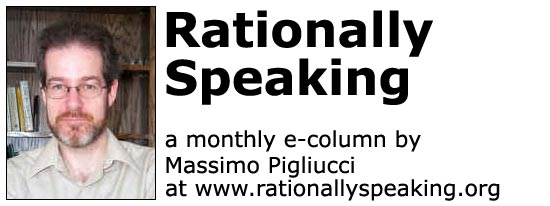|
|
|

N. 21, February 2002: Is philosophy useless? |
This column can be posted for free on any appropriate web site and reprinted in hard copy by permission.
If you are interested in receiving the html code or the text, please send an email
Massimo lets us in on philosophy's practical side.
|
If you mention philosophy at a party you are most likely to be greeted by rolling eyes, complacent smiles or embarrassed silence. Philosophy just isn’t considered a good topic for conversation, let alone for serious consideration in everyone’s daily life. This wasn’t always the case. On the contrary: philosophy, as we understand it today, was born in ancient Greece as a tool to improve one’s life, especially from an ethical perspective, and to find meaning and purpose in it. Today, so few people understand philosophy that most use meaning and purpose as synonyms, without realizing the difference.
Let me try to explain. Suppose you enter a restaurant and are given a menu to pore over. The purpose of that menu is to make it possible for you to eat at the place. The meaning of the menu is to present you with a series of choices to fulfill that purpose. If you don’t understand the language in which the menu is written, the menu has purpose but no meaning. If the menu is made of pictures of the food items available and you start to eat the menu, you are confusing purpose with meaning! You get the point.
One of the complaints that pundits of all stripes most often make about modern life is that it has become meaningless and without purpose (though they seldom make the distinction between the two), that ethics has become a luxury, is based on outdated and difficult to defend theologies, or has been drowned by rampant relativism that makes Cole Porter’s “Anything Goes” sound like an ironic prophecy.
So, why not resort to philosophy? After all, we have the accumulated thought of 2,400 years or more of cogitation about the deep questions of life, explored by some of the sharpest minds of the Western and Eastern traditions. What’s stopping us from dipping into this treasure and make philosophy work for us again?
Despite its general reputation for obscurity or irrelevance, philosophy is making a comeback. The American Philosophical Association has decided to celebrate its first centenary this year by promoting a series of activities geared toward the general public, including a series of radio shows featuring brief philosophical discussions. Furthermore, the United States has recently imported from Europe two potentially important new ways to bring philosophy out of academia and back to the people: philosophical cafés and philosophical counseling.
Philosophical cafés are open-ended discussions based on the ancient Socratic idea that asking questions is the best way to learn about a subject. In the United States, there is a Society for Philosophical Inquiry which helps people setting up cafés. The presence of an actual philosopher is a plus (you can get one on loan from the local University), but it is not deemed necessary. What is required is the willingness to openly question and discuss just about anything. No sacred cows allowed.
Philosophical counseling has also been pioneered in the old continent and is now slowly spreading in the US. The idea is to offer an alternative (which can be complementary) to traditional psychological counseling. After all, some people have emotional problems rooted in their past, but most of us simply don’t know how to tackle immediate problems or crucial junctures in our lives, and considering the broad picture, i.e. approaching the problem philosophically, might help.
Philosophical counseling is currently controversial, with professional philosophers as divided on the topic as professional psychologists were at the beginning of the psychological counseling phenomenon. According to the American Philosophical Practitioners Association, the role of a counselor is what Socrates advocated in ancient Athens: to be a sort of philosophical midwife, to help people understand that they do have a philosophy, but that they usually don’t think about it and don’t attempt to articulate it so that they can examine it and decide if that’s the sort of perspective on life they really wish to maintain. Critics accuse philosophical counselors of being sophists ready to sell their services for vile money (as if University professors don’t actually get paid, albeit little), but that’s a different discussion.
No matter how it is delivered, philosophy should be relevant to everyone simply because we tend not to do much thinking about problems small and large, and thinking is — allegedly — what distinguishes us from the rest of the animal world. The problem can be a major ethical dilemma or a relatively minor inconvenience. It may deal with what to do if one of your parents is physically incapacitated but mentally alert, or it may be spurred by a coworkers’ complaint about your taste in decorating your office (these are both actual cases from the philosophical counseling literature). Either way, it does help to discuss your views with other people, and to learn what thinkers from Socrates to Peter Singer have thought about similar problems or situations. Really, the choice is not to do without philosophy altogether, only to carefully examine the philosophy you do have or to be ignorant of your own perspective on life.
Read or Add Comments about Rationally Speaking
|
Massimo’s other ramblings can be found at his Skeptic Web.
Massimo’s books:
Denying Evolution: Creationism, Scientism, and the Nature of Science

Tales of the Rational: Skeptical Essays About Nature and Science
|
|
|
Back to Rationally Speaking
|
![]()